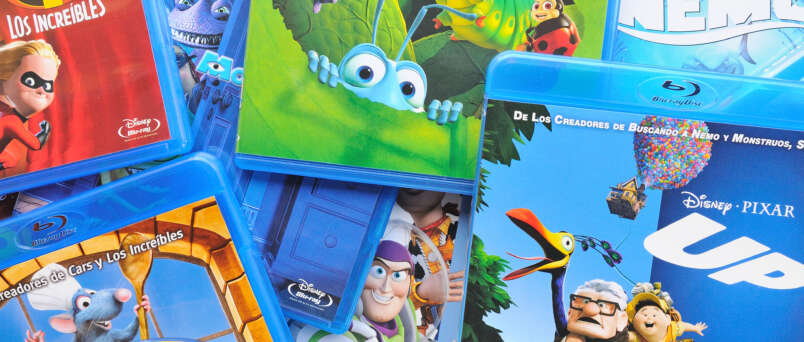If you’re interested in exploring movies about mental health, the best place to start might be the least obvious: children’s films.
Mental health has been a driving force in many big family films over the past decade, including Frozen, Inside Out, and most recently, Encanto. And not only do these movies touch on mental health topics in a way that’s relatable to people of all ages, but they’re also instrumental in changing the ways we understand and talk about it.
Here’s how children’s films like Encanto have adapted unique portrayals of mental health, as well as some of the core lessons that we can take away from them and relay to others.

Encanto: Mental Health Takes Center Stage
In 2021, Disney’s Encanto joined a list of other movies about mental health that have succeeded at broaching the topic with relatability, accessibility, and compassion. Not only that, it did so with a familial aspect that helps reduce the mental health stigma and shows children it’s both normal and okay to struggle with negative emotions.
Find below brief backgrounds of some of this film’s key characters:
- Luisa – In the film, Luisa is the middle sister. Though she is the physically stronger one, Luisa still feels the weight and pressures of the world, holding an undying belief that if she doesn’t step up for her family, no one else can and no one else will.
- Isabela – Then there is Isabela, the eldest sister and perfectionist. Isabela makes life decisions based not on what she wants, but on what is best for the family. Her main struggles come from significant anxiety and fear about ruining her near-perfect image.
- Mirabel – Mirabel, the youngest sister, often feels isolated and unspecial amongst her family. Such feelings are exacerbated when her fifth birthday comes around and she acquires no magic powers, leaving her struggling with notions of self-love and acceptance.
- Bruno – Bruno, the only son of Alma (Abuela) and Pedro, is known as the ‘black sheep’ of the family. With eerie visions and a reputation for “making bad things happen,” Bruno is forced to flee, becoming estranged from those he loves.
- Pepa – Tia Pepa, the aunt to Mirabel, Isabela, and Luisa and sister to Bruno, is one with unique abilites. Described as ‘overly dramatic and overly emotional,’ Pepa’s magic powers allow her to use her emotions to control the weather.
- Abuela – Abuela (Alma Madrigal), the matricarch of the family, has had a life mired in tragedy. Following the birth of her triplets and the untimely loss of her husband, Alma had to build a protected home for her family alone. Having no chance to comprehend and process her trauma, Abuela’s story is one to demonstrate that sweeping trauma under the rug does not mean it goes away.
In each of these characters, we see not only a struggle with mental health but an eventual willingness to be open about it. This openness leads to understanding, and it is through the love and acceptance of their family that these characters are able to come to terms with their situations and move toward a more positive future.
The familial aspect is central to the plot of Encanto and its approach to complex mental health topics. Viewers see how family can both negatively and positively impact mental wellness, and how being honest with ourselves and those around us can open the door to healing.
Other Children’s Movies That Depict Mental Health
Mental health has played a major role in many popular Disney and Pixar films, including Finding Nemo (anxiety), Up (grief), Inside Out (emotions), and Soul (depression and anxiety). Sometimes these lessons have been overt and sometimes you have to read between the lines in order to get the message. Nevertheless, each film has succeeded in helping change the way we discuss mental health, particularly at home.
Witnessing depictions of mental health struggles in film exposes children to the topic in a safe and non-scary way. It also helps reduce the stigma around mental illness, showing kids—and their parents—that mental health conditions aren’t something to keep secret or be ashamed of. In this way, children’s films can be instrumental in teaching younger generations about the importance of mental health, all while giving parents an opportunity to open the floor to discussion.
Using Film to Talk About Mental Health with Kids
All of us benefit from talking openly about mental health, and films like Encanto have paved the way for making it easier to get those conversations started. Here are some ways you can use children’s movies to start a dialogue with your own family and teach more compassion and understanding at home:
- Ask kids which characters they related to and why.
- Ask kids about the challenges certain characters faced, and how they think those challenges made the characters feel.
- Talk about the characters’ strengths and how sometimes we can be blind to the powers that others see in us.
About Retreat Family
Mental health conditions are bound to impact all of us at some point if they have not already. While relatable stories and films can help decrease stigma and otherwise open dialogue, it’s important to know where external resources and help exist if needed.
For helpful free resources, visit the Retreat Family website. In addition to relatable blogs and stories from real people and families, find weekly workshops, support groups, and private therapy sessions with your loved ones. Contact us today for additional inquiries.
